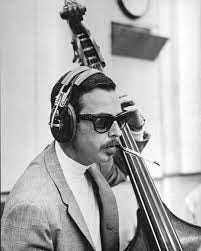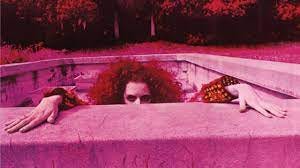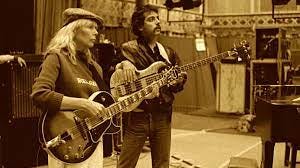Max Like
The arrival of Frank Zappa's Funky Nothingness brings another chance to appreciate Max Bennett
There will be a meeting of the Max Bennett Appreciation Society this Friday. It’ll be a groovy time.
It’ll start whenever someone presses Play on Funky Nothingness, a motherlode of unreleased music made by Frank Zappa and a small group (including the bassist Bennett) mostly at the Record Plant in LA in 1970. Some tunes from it are floating around the Interwebs (see below); the work, which Zappa sequenced with the intention of release and then abandoned, will finally be available in total on Friday.
Bennett, who was born in Oskaloosa, Iowa, had been the bassist on Hot Rats, the mostly instrumental 1969 project that helped establish Zappa as a musical visionary (and not just a satirist) and is regarded as a key catalyst in the evolution of jazz-rock fusion.
When he got the call for that date, Bennett said in an interview, he was “not familiar with Zappa’s music. Our paths never crossed. I was never a big fan of avant garde music in that sense.” No matter. He did what studio musicians in Los Angeles have always done: He showed up, established musical communication with drummers John Guerin and Paul Humphrey, and in what Bennett remembered as double sessions over two nights, Hot Rats was born. (He played on every track except “Peaches en Regalia,” where the bass was handled by a very young Shuggie Otis.)
By that time, Bennett had serious credentials as a jazz musician. In addition to his own records for Bethlehem, he’d recorded with vibraphonist Terry Gibbs and guitarist Laurindo Almeida, held things down in the monstrously creative Bill Holman big band, and recorded repeatedly with Peggy Lee, Mel Torme and Ella Fitzgerald.
Just in the months before the Hot Rats sessions, Bennett handled low-end duties on Lalo Schifrin’s stylized score for Bullitt and an Elvis Presley film called Change of Habit with Mary Tyler Moore; he recorded with Carmen McRae, Bobby Blue Bland and Big Joe Turner.
The following year, Bennett worked on Ry Cooder’s debut album, The Partridge Family Album and records by Harry Nilsson, Otis Spann and England Dan and John Ford Coley.
And it goes on like that. For decades. Bennett was affiliated with the Wrecking Crew, the A-list LA rhythm section that created enduring, gorgeously apt arrangements for the Beach Boys, Glen Campbell and many others . Carol Kaye was the first-call bassist – she got the Beach Boys. Bennett got the Monkees.
But there was plenty of work to go around – if, that is, you were a musician who paid attention to the essential traits and tiny nuances that define various styles/genres. That is the central lesson of Bennett’s remarkable winding road: He didn’t exist in a stylistic silo like so many musicians do today. He was curious and open-minded, and as a result could throw down with blues titans and put persnickety jazz vocalists at ease. He could lock into a sinewy funk line to accompany a detective’s stealth pursuit, and then play pretty for orchestras scored by Nelson Riddle or Percy Faith. And then he’d turn around and execute the angular poly-metric agitations embedded in the Zappa code.
Funky Nothingness underscores the Bennett strengths. It started in the guitarist’s basement Quadraphonic studio (the first of three versions of “Chunga’s Revenge” was captured there) and then, as things developed, moved to the Record Plant. This was a period of dizzying productivity for Zappa – within months he’d produced the Captain Beefheart debut Trout Mask Replica, released Uncle Meat and toured for the last time with the original Mothers of Invention. It’s entirely possible that Zappa, needing an ear break from the highly conceptual work he’d been developing, turned to Bennett and British drummer Aynsley Dunbar for rocket-fueled escapist romps through old R&B, doo wop and blues. The feeling around these mostly-live-in-the-studio sessions is open and loose, with lightning-fast interactions bouncing all over the place. On some records, it’s possible to “hear” the smiles on the faces of participants; this is one of them.
Bennett, who died in 2018 at age 90, was a bassist for hire. He lived on the reputation he built track by credited track. He was a legend of the fine print on the back covers of albums. That means despite hundreds of credits with big stars and mammoth talents, he’s a bit of a phantom presence today – the streaming services, in all their arrogance, don’t regard his contributions as significant enough to send along with the tracks.
Today Bennett is probably best known for playing on classic Joni Mitchell records beginning with Court and Spark in 1974. Along with woodwind master Tom Scott, Bennett developed the rhythm section known as LA Express, a lithe fusion crew with Guerin on drums, Joe Sample on keyboards and Larry Carlton on guitar. This group played regularly around LA, and after catching a set, Mitchell invited them to join her in the studio. In an interview with Dave Blackburn posted on Mitchell’s site, Bennett recalled that the players, all studio veterans accustomed to reading charts, had mild panic at the start.
“The harmonic structures that she used – it was so unique,” Bennett said. “There wasn't anything to read! She played, and we made sketches of what we needed - she pretty much had it set what she wanted to do on a lot of her things. Tom wrote some background stuff too for her; you know he was very good at that. I didn't have much to do with that. I just made up my own bass parts, and everyone else made up theirs and we just worked it out.”
Here's a clip from Mitchell’s 1974 tour with the LA Express. The sound is, alas, somewhat indistinct. Hey, it’s old. And that rhythm section lock? It’s eternal.
There’s a tendency to name-drop when writing about under-appreciated figures like Max Bennett. It’s a logical default, given that many music people know the records he helped make but don’t necessarily know of him. I’m guilty of that here. I’d argue it’s necessary – to show just how versatile musicians had to be not so long ago, and how that quality led to richer, more dimensional works. The demands of that era reflected an orientation to the great wide world of music (and, for that matter, to life) that is somewhat under threat in 2023. We’ve got highly specialized ninjas who can deliver brilliance on cue – as long as it’s squarely in their wheelhouse. What we maybe don’t have, in abundance anyway, are musicians who can discourse with T-Bone Walker on a Monday and Joni Mitchell on a Tuesday, and make both shine.








Great catch, indeed that is Mr. Klein. Sigh. I thought I found one there, esp since it looks like one of the rooms at A&M. but then many look alike. thanks
Wonderful and inspiring! Thanks for shining a light on Max Bennett, one of our unsung bass heroes. I do believe, however, that the bassist pictured with Joni is in fact Larry Klein, c. 1980s. Good photos of Max are hard to come by.